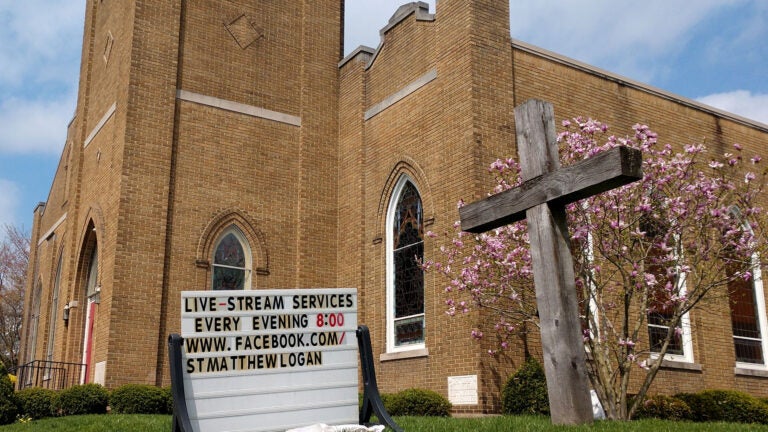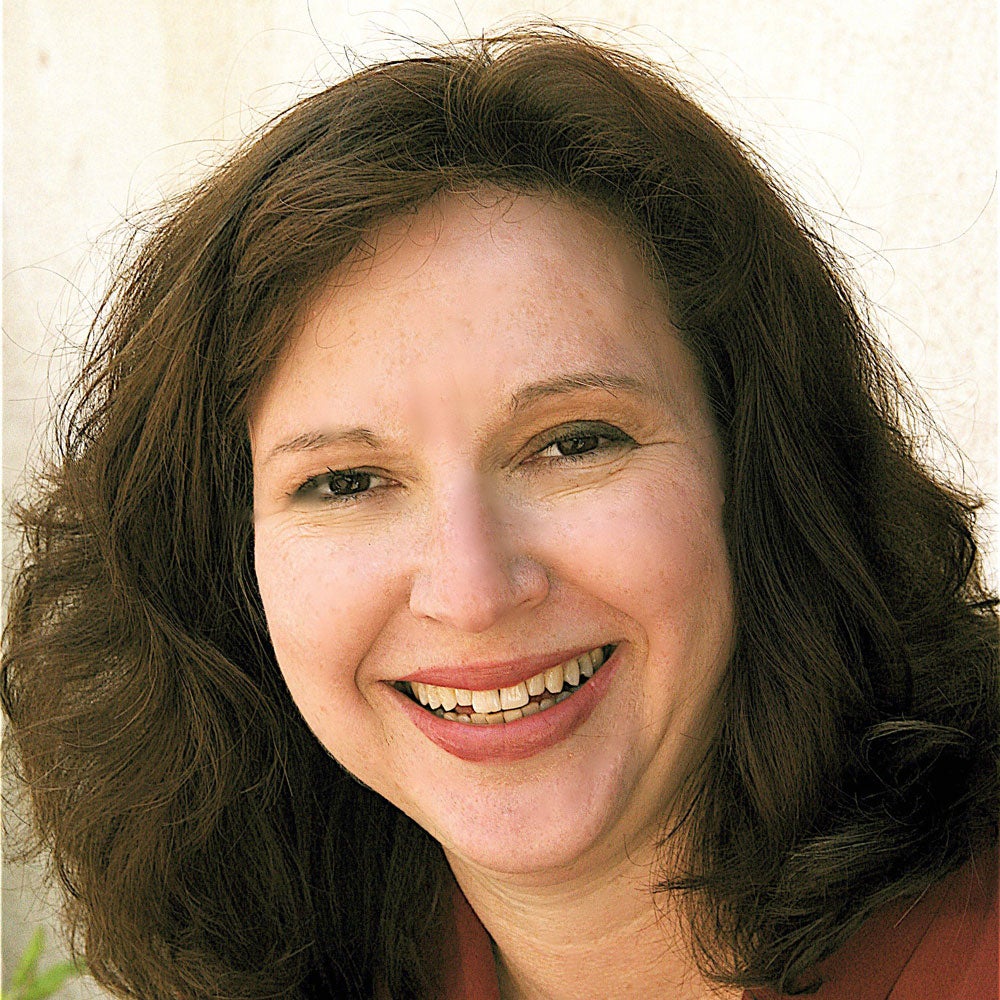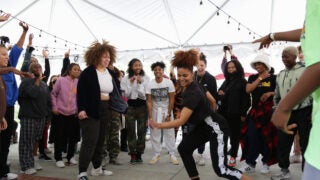
As holy week progresses, people around the world adjust to remote remote worship practices. (Photo/Dan Keck)
How are religious groups responding to the coronavirus pandemic?
As the faithful celebrate Passover and Easter from home, a USC expert on religion and media describes how spiritual institutions are adapting in response to COVID-19.
As the faithful around the world celebrate Passover and Easter, religious and spiritual institutions are adapting and changing in response to the coronavirus pandemic. Diane Winston, an associate professor at the USC Annenberg School for Communication and Journalism and the Knight Center Chair in Media and Religion, answers questions about how religious groups are responding to the coronavirus pandemic with virtual services and calls to help the most vulnerable, and why others are defying orders not to congregate and calling the outbreak “God’s judgment.”
How are various houses of worship coping with the sudden changes and inability to hold in-person services?

My journalism students and I have been tracking this, so I can only answer anecdotally because I have not seen any surveys or hard data. My sense is that many congregations are putting their services online. They’ve transitioned quickly, and some even have expanded beyond worship opportunities. I found one synagogue in New York City that has online activities every day, and I am sure it is not the only one.
Here in the Southern California region, Jewish congregations are pooling resources to provide activities from morning through evening. Every day, there are online options for kids, adults and seniors. There’s singing, praying, exercise and meditation. They even offer bedtime stories and, of course, Torah study.
If synagogues in our area are collaborating online then there must be similar things going on in other cities, where local religious groups want to provide assistance as well as bring people together at this difficult time. People are seeking community; they want to see other faces and hear other voices. Creating community is the sweet spot for most religions.
Is this a time where churches, synagogues and mosques might be able to reach more people via online tools and programming?
This could be a boom time for religions and other spiritual practices because many Americans are not only seeking community; they’re also looking for things to keep them busy when they’re stuck at home. When people search for an online book group or meditation or sing-along, they may find religious options. I’m curious to see if there will be a spike in people’s religious activities and whether that reflects new commitments or just a desire to do something.
Do you think people are praying more?
A recent survey said that people are praying more. That’s not surprising because people pray all the time. They pray to find true love, to ace a test, and even to get a parking spot, People pray when they’re stressed and when they want something. Now, people are stressed and they really want something, so I’m not surprised that many Americans — even non-religious ones — are praying.
The coronavirus may be the biggest religion story of our lifetime.
Diane Winston
Think about it: The coronavirus may be the biggest religion story of our lifetime. It raises metaphysical questions: Why is this happening? How did it happen? What does it mean? Questions like that can lead to prayer. The virus also confronts us with moral decisions every time we walk out of the house: Do I wear a mask? Should I go to the supermarket? How can I help my neighbor and not endanger myself?
The big questions, which many of us try not to think about, are hitting home. We’re confronted with life and death choices, not just about our own well-being but also about our communities: Who gets a ventilator? Why are groups of people more susceptible than others?
We’re also realizing that we have very little control over our fate, which is frightening. And so, whether or not someone sees themselves as conventionally religious or not religious at all, it’s hard not to be engaged with the spirituality and ethics of the pandemic — and to pray.
This happens to be a holy week for some religions. Will people take special meaning from this pandemic? Do you think they will interpret their spiritual traditions differently?
The coming holidays for Jews and Christians have profound resonance during this current crisis. Passover celebrates the exodus from Egypt, and Jews recall their passage from bondage to liberation. It’s easy to see the present moment as one of constraint and to look forward to when we can leave our homes and resume our lives. So, the epidemic speaks to the Passover message.
It’s also a time to recognize that other people remain in bondage –whether to poverty, prejudice, addiction, political circumstances or illness. Many of us take our privileges for granted, but this is a moment to realize how fortunate we are. Those of us with homes, job security and food on our tables are lucky. Many people are risking their lives to help others, whether as medical professionals or as service workers or as delivery people. And some of these folks are still working outside their homes because they need money for food and rent. Passover reminds us to be mindful of those who are risking their own well-being for the sake of their families and their communities.
This also is Easter weekend, when Christians celebrate Jesus’ resurrection. This, too, is a time to think about how God acts in our lives and what God calls us to do. Maybe this year, it’s also a renewal of our sense of community and our desire to live like Jesus.
That leads to a question about charity. Many religious leaders are encouraging worshippers to engage in charity, whether it’s direct financial contributions or service. Are you observing people just having more of a desire to give back and do things for their communities?
All kinds of active charitable activities are being organized by religious folks, students and community groups. My friends are making sandwiches and bringing them to Skid Row. Faculty have set up systems to help elderly and immunocompromised colleagues. A volunteer group is collecting household goods for new homeless shelters.
Every day, new volunteer opportunities appear in my email.
And then there is the other side of this, a darker side, where there are some religious leaders who seem to be saying, “Maybe God is punishing us.”
The interesting thing about religion is that anyone can claim anything because most religious texts are open for interpretation. Slave owners used the Bible to justify slavery just as abolitionists used Scripture to condemn it. Some religious leaders call COVID-19 “God’s punishment” because they view bad things as examples of divine wrath. Before this virus, they claimed God punished us with tornadoes, earthquakes and AIDS. It’s a particular theology that sees God messaging us through nature, and the news is never good.
That’s one of the takeaways from the virus: We are bound together and interdependent.
Diane Winston
There also are religious people who are still gathering together, despite public health warnings, because they feel that this is what God wants them to do. This, too, is a theology that claims to know God’s will. Many other religious leaders are calling congregants to gather online. Their message is that the pandemic has nothing to do with God but that our understanding of God will shape our response to it.
At this moment, with two of the world’s largest faiths celebrating some of their most holy days, what are some things they can bring to the forefront?
Whether you’re looking at the Passover service of freedom or the Easter belief in the resurrection, there are common themes of community, service and freedom. The holidays ask us: How do we live together, how do we care for each other and what do we do with the gift of freedom?
Those are questions that many Americans often forget, because we focus on ‘How can I get mine? Is my house big enough? Do I have a new car?’ We live in a materialistic and individualistic society, but COVID-19 shows that we are all bound together.
That’s one of the take-aways from the virus: We are bound together and interdependent. You can catch this from a stranger, or you can get it from a neighbor or a member of your family. On the other hand, you can be helped by a stranger and cheered by a loved one who reaches out online. We are dependent on medical providers who we will never meet, and we rely on men and women, who don’t know us, but who deliver the mail, run the grocery stores and make home deliveries. The people working at the frontlines of COVID-19 are the true heroes.



